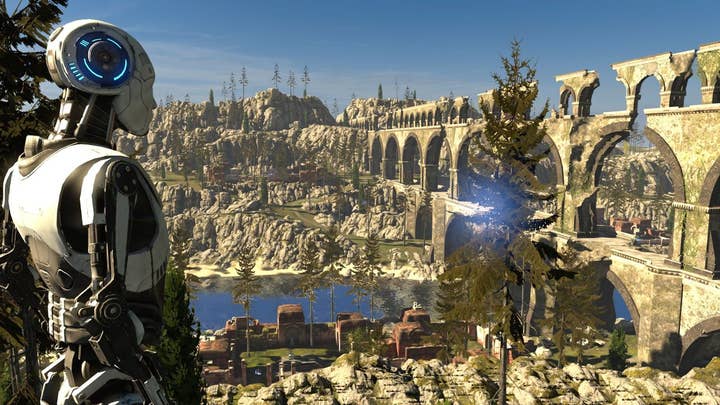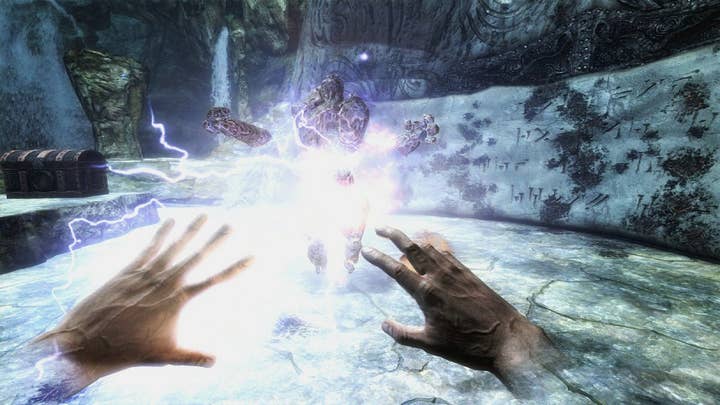Croteam: "VR-only" isn't the only way with VR
The Croatian studio is meeting the demand for bigger VR games by drawing from its existing portfolio
It was Serious Sam that brought Croteam to the attention of the games industry, and it is Serious Sam that has allowed the studio to make its mark in VR.
Croteam first started in 1993, at a time when Croatia's industry was no more than a handful of small teams working out of passion rather than desire for profit. "We were making things for fun," says Alen Ladavac, a veteran of Croteam since the very beginning, and its CTO since 2005. "A lot of us were in the demoscene. Making a game was a high goal, an ideal."
It may have been an ideal, but it was achievable. With Football Glory in 1994, Croteam became the first Croatian studio to actually ship a game, and with Serious Sam: The First Encounter in 2001, it was the first Croatian studio to "become more well known" outside of its native country.
"Right now you have more than 600 VR-only games... And still you have people saying that there's not enough games"
Croteam is now a thriving business, and a talismanic studio for the few dozen studios that now comprise the Croatian industry. At Reboot Develop, where our conversation took place, Ladavac gave the keynote address to an audience that included Jonathan Blow, Cliff Bleszinski, Goichi Suda, and a host of other luminaries.
Clearly, much has changed for Croteam in the 16 years since Serious Sam noisily announced himself to the world, but the same franchise that changed the company's fortunes is the very one that has allowed it to recapture the idealistic passion of those early days.
"We did it for love," Ladavac says, describing Croteam's decision to add VR support to its Serious Sam games. "We wanted to contribute to VR. It was more about whether we could cover our development costs [than make money], and this seems to be working. You can't always look at the biggest possible profits."

There are now three Serious Sam games available for VR platforms: The First Encounter, The Second Encounter, and The Last Hope, all of them released in partnership with Devolver Digital between October 2016 and April 2017. Diving headlong into VR was fun, Ladavac says, but doing so was also motivated by the firm belief that the Serious Sam games represented something that the fledgling market lacked.
"Right now you have more than 600 VR-only games," Ladavac says. "If you don't count the games that are ported there's still 600 games for VR on Steam. That's just from browsing through the Steam interface - very unscientific stats - but there's hundreds of games, okay? And still you have people saying that there's not enough games."
"You're not going to see a VR-exclusive Ghost Recon: Wildlands or Mass Effect Andromeda. That's not going to happen any time soon"
Specifically, Ladavac says, the feedback he picked up from reading forums, Reddit, and other online venues where gamers come together to gripe was that there weren't enough 'real' games - a nebulous term that Ladavac interpreted to mean games with more substance than the brief, snackable experiences that defined "VR-only" gaming in the early days of the market (and to a large extent still do). "Something with a longer campaign," to use Ladavac's description.
For people who love shooters, RPGs and genres that make frequent use of the first-person viewpoint, VR is an exciting prospect. However, Ladavac and Croteam noted the caution with which developers were proceeding, often limiting both the length of the experience and the amount the player was allowed to move in the name of ensuring comfort.
"You couldn't get a feeling that you're in a large world, and that always bothered me," he continues. "For a long time I thought the problem is that the people who want to [be more immersed] in those worlds, we all want VR. But we got everything else except for that."
However, the prevalence of short and restrictive experiences was down to more than just ensuring that nobody felt sick. With no hard data on how many headsets had been sold, developers were simply unable to calculate the risk involved in making a more substantial product - a 'real' game, to invoke that problematic term again. Serious Sam offered a way around that problem, and not just because it was a recognisable brand with an existing community.

"VR is a complicated situation for various reasons," Ladavac says. "When we decided to go for shipping Serious Sam for VR, it wasn't just about shipping an established IP; it was also the fact that it was a game that already had content."
Without being funded by one of the platform holders - Sony and Oculus, in particular - Ladavac believes that products like Serious Sam are the best way to provide VR's early adopters with more substantial games. Capcom did just that with Resident Evil 7, adding a VR option to a game that was designed to be played on a 2D screen.
"We did it for love. We wanted to contribute to VR... You can't always look at the biggest possible profits"
This year, Bethesda will release Fallout 4 VR, and Sony's E3 press conference brought the news that it is also working on a VR version of Skyrim.
Indeed, carefully crafted ports are the reason why Croteam has a VR strategy at all, and that represents a thumbed nose to the oft-mentioned idea that VR demands 'ground-up' experiences if the market is to grow. When Croteam looked at the market, it saw a desire for products on a scale that simply wouldn't be feasible if it was "VR-only" - or a new IP for that matter.
"I don't think at this moment it would be profitable for anyone," Ladavac says. "Maybe for a small team that uses a lot of off-the-shelf content from the Unity store or something, they might be okay-ish. I don't think at this moment any bigger company is going to invest in that. You're not going to see a VR-exclusive Ghost Recon: Wildlands or Mass Effect Andromeda. That's not going to happen any time soon."
While companies like Microsoft and EA continue to play the waiting game, though, it's hard to see the fact that Croteam is following up Serious Sam with a VR version of its widely praised The Talos Principle as anything other than a huge positive for the market. "It's the last one because it's the most complex, so we're implementing things as we go," Ladavac says, though he stops short of estimating its release date.
And he's also reluctant to think too much about how successful Croteam's most celebrated game might be when it hits VR platforms (probably) sometime this year. "Predictions are difficult," he says with a smile. "Especially predictions about the future."
GamesIndustry.biz is a media partner for Reboot Develop. Our travel costs were covered by the organiser.
